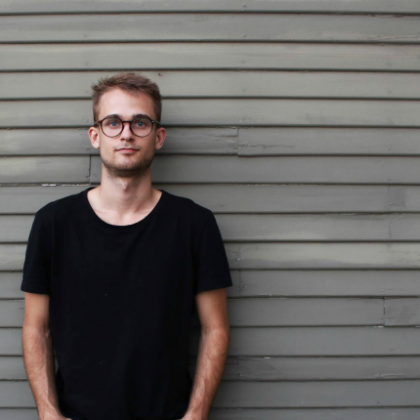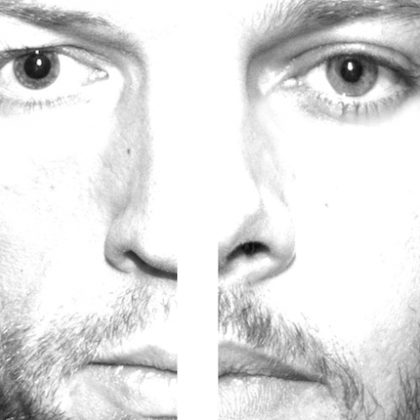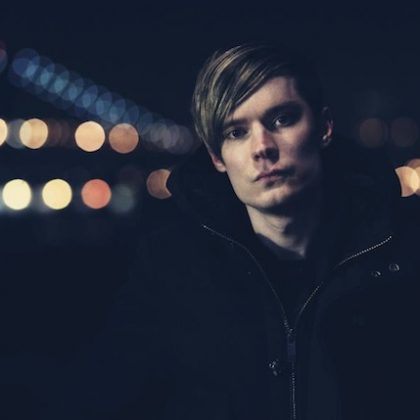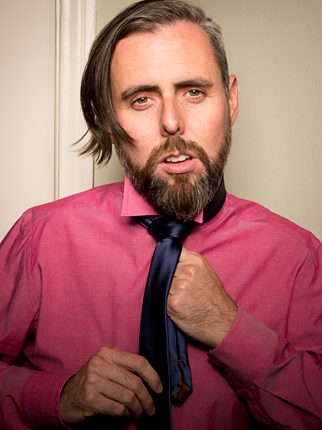Droog Takes the Culprit Sound From Los Angeles Clubs to the Global Dancefloor

When Andrei Osyka, Brett Griffin and Justin Sloe—collectively known as deep house trio Droog—launched their Culprit imprint in 2009, they were really on to something, whether they knew it or not. Before deep house was the theme music for the cool kids’ club, before names like Jamie Jones and Seth Troxler were headlining festival mainstages, Droog were deep in the trenches, establishing the genre as a legitimate movement.
On the regional circuit, Droog became local heroes in Los Angeles via their renowned carouses in the mid-2000s and established one of the hottest parties to ever hit L.A. by early 2008. Hosted at the downtown Standard, their rooftop bacchanalias became the talk of the town—welcoming Maya Jane Coles, Dixon, the Martinez Brothers, Guy Gerber and many more—and cemented Culprit as a driving force in the underground dance scene within the City of Angels and beyond.
Culprit was born from those ballyhooed celebrations and ultimately solidified Droog as a power player in the global house movement and helped initially put Los Angeles on the international deep house map.
In short time, Culprit rose to the top of the ranks as one of the essential imprints in independent music. Everyone from Lee Foss, Soul Clap, Benoit & Sergio, Lee Curtiss, and many other like-minded artists have called Culprit home. The label also helped launch the career of Hot Natured, the supergroup spearheaded by Jamie Jones and Lee Foss, whose 2009 h.e.a.d.s. EP served as Culprit’s debut release.
Now, six years since launching their imprint, Droog have gone full-circle to finally unleash their first-ever project on Culprit via the Spectral EP. The four-track release is a collaboration with Culprit rookie Edu Imbernon, the rising star from Spain. The Spectral EP explores the deep house and tech house aesthetic, which has come to define the Culprit sonic canon. It’s been a long time in the works for the Droogs, but Spectral marks their much-awaited homecoming.
We visited Andrei Osyka and Brett Griffin in their Downtown L.A. recording studio loft to discuss the sonic evolution of Droog, the heavy influence Culprit has left on the Los Angeles and international deep house circuit, and the new direction of the ongoing Culprit event series.
You’ve just released your first EP as Droog on your own label, Culprit, for the first time ever. Why now?
All the stuff that we’ve made as producers has been for other labels. We wanted to distinguish ourselves by producing on different labels. We wanted to prove that there was appeal to what we were doing. It’s easier, in a way, to A&R yourself instead of going out there in the open market to submit it to other labels. For a variety of reasons, we’ve pursued quality over quantity; whatever is released with our name on it has to be of a particular quality, or else we’d rather not release it. This is the first time we’re actually doing something for our own label, now that six years have passed.
A little bit of it is probably a sense of wanting to be part of the community. We wanted to be a part of the community and their crews. It wasn’t that our label wasn’t good enough for us, but more like all of these people we have looked up to for so many years, those were the people we wanted to be involved with—feeling like you’re part of the family.
And proving to the community that the work can stand on its own without us backing it as well. We can always release it on our label, but we want to prove what we release has merit, and we don’t just want to push it on our label. There have always been half a dozen labels we’ve always loved as DJs; there’s always been a sort of pride to be able to release on them.
Our label, in this case, was exactly the right place for it. We can finally do for our label what maybe we’ve done for some other releases we’ve had that have been successful. It’s definitely music to be proud of and just the right time to do it.
“It’s harder than ever now to maintain visibility as a label because there’s so many of them, but that’s what we get up for in the morning.” —Andrei Osyka
The Droog collective gave birth to Culprit. How do Droog and Culprit relate?
Culprit is a reflection of Droog. It’s run as a business, but at its core it’s just a manifestation of who we are.
That seems to be the trend now: record labels operating as lifestyle brands, as opposed to traditional record businesses.
All of the hallmarks of a business, they do exist. Sales are important, all those things. But for us, the label would have existed anyway; it’s become part of our identity. The whole project, what we do every day, a lot of it has to do with the label. Outside of events we have as Droog, we also spearhead Culprit as a sort of “roaming circus,” as we call it. Again, we try to maintain business relations because everyone’s a professional now, but whoever releases on the label and whoever decides to sign to the label usually become friends, or we’re close to them, or we know them. We have an organic connection to every artist. It’s harder than ever now to maintain visibility as a label because there’s so many of them, but that’s what we get up for in the morning.

It’s an interesting time. There are so many artists with their own labels nowadays; it’s quite a saturated market. Still, I feel like fans are identifying with the indie movement now more than ever before. For Culprit, fans are flocking to the sound of what’s not popular.
For the fans, it also gives a sense of identity or belonging—especially those who have been with us since the beginning. The label was an offspring of our rooftop parties we started in early 2008. We started doing our own events under the name Droog; the parties were called Droog and we also called ourselves Droog, and it started in 2006. We started bringing international guests in 2007, and in 2008 we had an idea to do a party on the roof of the Standard [in Los Angeles]. The sound is a melding of deep house and deep techno. The label was inspired by it and came about a year later. It started feeding off each other. The label started growing on the basis of that. It’s been really organic with development; it’s been a steady climb.
It seems like the Culprit parties and your collaboration with the Prototype series at Lot 613 in Los Angeles is making deliberate moves toward the underground.
It’s a reflection of the fact that things have changed from what people call “deep house” now. We wanted to do something fresh. It’s no more complicated than that. At the same time, it’s also a reflection of us seeing that—five to seven years ago—was a small niche sound where possibly we were the first label to spring from L.A. There were a lot of English labels, some German, that were catering this new take on deep house at the beginning. A lot of people here in L.A. identify with us as the first ones based in L.A. that took it up a notch. We wanted to organize a framework to push this music out into the world, not just for a small niche following out in L.A. We wanted it to be globally recognized. Now the genre [has] become a thing, and when it becomes a thing, it’s important to keep moving forward. It’s true for any musical genre or label.
It’s important—when you have the trust of the people who are supporting you—to take it places. Right now, we feel like the sound itself and the vibe of the parties, it’s important to take it a little bit to the basics, to the way dance music felt in the ‘80s. We remember coming into it and catching those last glimpses of the first and second generation of dance music, when dance music felt like a rebellion still. We felt like the authentic vibe was going a little more underground, and Lot 613 allows us to do that.
Can you talk about the Prototype-Culprit collaboration?
Prototype is the brand name for a regular series of parties that happen at Lot 613. Downtown is a cool place to be now; there’s a move away from Hollywood, both figuratively and literally. There were a couple of clubs in Hollywood that held a lot of promise, but the move for this kind of music is now Downtown, Echo Park, the eastside.
We’re part of Prototype parties, but we’re not the only ones. We’ll be doing monthlies. Once in a while, we’ll actually skip a month, because our whole thing has always been that promotions are a means to an end. For us, it’s always been a way of promoting the label, promoting us as DJs. It’s also a way to connect to the people of L.A. We love the city, even though none of us actually are from the city. It’s been our home for 15 years, and we feel that you always have to maintain that presence in your own hometown. The monthly Prototype parties are our exclusive promotional outlet and will be for the foreseeable future. It’ll develop into something; they’ll have just as much appeal and potency as our rooftop parties have had.
“We’re proud of we’ve accomplished, but there’s definitely a lot more.” —Brett Griffin
Lot 613 seems like the right fit for the Culprit sound.
We really wanted to take it to that place where it was 10, 15 years ago, where you’d just come to the club, and you better wear comfortable shoes. You’ve got to get down. We want to gently push people to get into it more. It’s more of a challenge. We’ve done night parties before, but in a very sporadic way. Now we’re getting people used to a different Culprit. The essence is the same; it’s just a different form.

It’s kind of a reflection of what’s happening in electronic music overall: a new sound, a new experience. Culprit and Droog are really moving with the times. How does a label like Culprit or an act like Droog remain relevant?
You have to stick to your guns. We don’t mind being an incubator for young talent as long as some of the people we’ve invested in—especially those we’ve invested a lot of personal attention to—occasionally refer back to us, whether it’s playing our parties or being part of the crew once in a while. I like the idea of never standing still and always looking for the fresh—whether young or older—faces coming up with some new ideas.
The independent industry that’s existed for as long as dance music existed has always been very loose. Business relationships have always been very relaxed. It will be interesting to see—now that there’s so much commercial big business in dance music in general, even underground dance music—how many of those business relationships will be imposed onto the genre. In more commercial dance music, once a label grabs an artist and they invest a lot of resources into the artist, it’s their artist one way or another. We’ve yet to see how this will develop, but right now we’re not super worried about it. Right now, we just have to do what we’re doing. We’re not really possessive of artists. If you have a vehicle for releasing your own music, absolutely, we can encourage it.
Do you feel Droog and Culprit are successful?
Yes, but we’re never truly satisfied. I think in terms of what we’ve been able to accomplish on both fronts—in terms of respect and being known and having some degree of influence—yes, I think so.
[Yes], if we judged ourselves by the very first goal we had, which was not necessarily to be huge DJs or be superbly influential recording artists. Our first goal was always to make something super special in Los Angeles.
Ten years ago, it felt like there was a bit of a vacuum for our style of music, and we were able to fill it to some degree. It’s made a mark, and that’s the most gratifying thing. We’re still hustling and yearning for more.
To check off another box, it was to really put Los Angeles on the map. There were so many people doing so many incredible things before us. In terms of clubs, L.A. was already on the map. But for us, it was this thing going on in Europe, this very deep house sound.
It was basically a European sound viewed through a prism of L.A. Adapting that, we spent time in Ibiza some years ago; that was hugely influential in terms of what we wanted to push. In some ways, without false modesty, we played the part. But there’s so much more to accomplish. We want some of that Calvin Harris money, goddamnit.
I feel like sometimes if you’re at the top like that, you feel disconnected, and you see some people start boutique vanity projects because they want to get back to what they do. Your outlook on things changes as you go along. We’re proud of what we’ve accomplished, but there’s definitely a lot more.
Follow Droog on Facebook | Twitter
Follow Culprit on Facebook | Twitter





